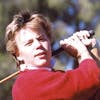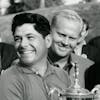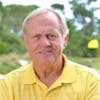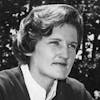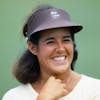Tom Watson - Part 2 (The Open Championships)
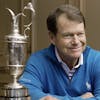
Winner of eight major championships and World Golf Hall of Fame member, Tom Watson, joins us to re-live his Open Championship experiences including the highs of five wins and the lows of disappointing defeats at the Old Course and in 2009 at Turnberry at age 59. He recounts his first experience with links golf preparing for his first Open at Carnoustie, the iconic “Duel in the Sun” with Nicklaus at Turnberry, his “emergency nine” with Arnie at Muirfield, his back-door win at Troon and his memorable 2-iron into the last at Birkdale. Tom fondly recalls the influence Jack Nicklaus had on his career (and he does a pretty good Nicklaus impersonation to boot). Tom Watson shares his Open Championship memories, “FORE the Good of the Game.”
Support the showFollow our show and/or leave a review/rating on:
Our Website https://www.forethegoodofthegame.com/reviews/new/
Apple Podcasts https://podcasts.apple.com/us/podcast/fore-the-good-of-the-game/id1562581853
Spotify Podcasts https://open.spotify.com/show/0XSuVGjwQg6bm78COkIhZO?si=b4c9d47ea8b24b2d
Google Podcasts https://podcasts.google.com/feed/aHR0cHM6Ly9mZWVkcy5idXp6c3Byb3V0LmNvbS8xNzM3Mjc1LnJzcw
About
"FORE the Good of the Game” is a golf podcast featuring interviews with World Golf Hall of Fame members, winners of major championships and other people of influence in and around the game of golf. Highlighting the positive aspects of the game, we aim to create and provide an engaging and timeless repository of content that listeners can enjoy now and forever. Co-hosted by PGA Tour star Bruce Devlin, our podcast focuses on telling their life stories, in their voices. Join Bruce and Mike Gonzalez “FORE the Good of the Game.”
Thanks so much for listening!
Music playing 00:10
Intro Music
Mike Gonzalez 00:17
Well, he turned professional in 1971, went to tour school, did okay. You find yourself on the tour. There's a lot we can talk about with your early tour record, some of your key wins. But we thought what we would do with the time that we have is to just jump right into the Open because it is Open week and you're known, obviously, for your great success in the Open Championship, having won five times, on five different golf courses. Why don't you just tell us, before we get into individual tournaments, just about your experience with the Open, why you came to love it so much, because you weren't that big a fan necessarily of links golf day one, were you?
Tom Watson 00:59
No, no, I hated links golf. The way I got into the 1975 Open at Carnoustie was that I was an exempt player. I'd won the Byron Nelson Golf Classic and I'd won the year before at the Western. But I think the Byron Nelson and my position on the money list got me in as an exempt player. I traveled over to London and spent some time with John Mahaffey and his uncle. In London, we played around a golf there. And then we traveled up to Edinburgh and up to Carnoustie where we had a little rental house there and Monifieth and we, we dropped ourselves off there and we go to the golf course to play a practice round the very first day we got there. And we reached the golf course and out comes, Keith McKenzie, he was the secretary of the R&A. And Keith he was a very infectious guy, and he says his name and welcomes us there and I made the comment and said I can't wait to play the golf course today. He said oh, Tom, you can't play the golf course today. What? You can't play the golf course today, you know, this is three days before the Open Championship. The Golf Course is reserved for the qualifiers, the people that had qualified over there for the golf tournament, for the Open. So, we ended up going to Monifieth play a round a golf there on a links golf course there. And I'll never forget my first drive, hit it right down the middle of fairway along with Mahaffey and Hubert Green who were playing with me, and I lost the ball.
Bruce Devlin 02:50
And you said, What the hell am I doing here?
Mike Gonzalez 02:53
Welcome to links golf.
Tom Watson 02:55
What type of golf is this? You know, the ball eventually was found, but only after I hit, I just dropped one and played to the green and Mahaffey and Green played on. And just at the last moment I went, you know, 30, 40 or 50 yards off to the left in the little hole down there. There was the golf ball. And that ball was hit down right down the middle of the fairway. And it hit the side slope like this, and it went off like this. And I said, I don't know if I'm gonna like this or not. Well, again, it was really bouncy. I mean that year in 75 it was dry as a bone. There was no rough anywhere. It was just, it probably suited me, you know, in my game. At Carnoustie, the only thing you had to do at Carnoustie is keep the ball out of the bunkers. And it had a few sparse places of gorse there. And I did a pretty good job of that and ended up in a playoff with the Jack Newton and won the golf tournament. I remember, after we played the Tuesday's practice round, because the tournament started on Wednesday. We were at the practice ground at Monifieth. They let us hit our own balls go pick them up. Mahaffey and Green. I remember, I'm literally at 10 o'clock at night, we were hitting balls out there because I had a late tee time the next day. And I found something in my golf swing, I was hitting one irons and I was hitting it, clipping off that tight turf, putting the ball up in the air like this. And I said, man, that feels pretty good. I better go with that thought in the tournament, which I did and ended up, that thought propelled me on to victory. And I'm sure Bruce, you've had the same thing happened to you. You go into a golf tournament, maybe unsure about your golf swing and you make a change, you make a change in something. And all of a sudden things click. They just click like that. And you hit a shot and then you confirm, then you confirm, then you confirm, that yeah, this is it. And boy does that open up the floodgates as far as you know, the pressure is not as great on you, you have confidence in what you're doing. And you go out and play. You play, not with abandon but you go out and play with the confidence that you're doing the right things that you're not going to screw up very much.
Bruce Devlin 05:27
Or, or you could get a lesson, like I did before the tournament in 1964 from one of your heroes, Mr. Nicklaus. And we were on a practice tee on a Wednesday before the St. Pete Open and I said oh damn I'm driving it so bad. And he said, well, why don't you do this? And what do you know who finished second?
Tom Watson 05:52
Jack finished second and you won.
Bruce Devlin 05:56
That's the last lesson you will ever get. Thank you.
Mike Gonzalez 06:02
Well, at Carnoustie Tom, you had to make a pretty sizable putt just to get the playoff on the last, didn't you?
Tom Watson 06:10
Yeah, the last day was a windy day. The first three days it was very calm, and scores were really low. 66's, 65's were shot at Carnoustie and that was unheard of.
Bruce Devlin 06:21
Yeah.
Tom Watson 06:22
Such a tough golf course.
Bruce Devlin 06:23
Very tough.
Tom Watson 06:24
But again, there was no rough, if you kept it out of the bunkers, you were going to be okay. But the last day, it blew it blew hard. And I'll never forget, Mahaffey and Green and I, we warmed up at Monifieth, because the practice ground at Carnoustie wasn't very good. So, we warmed up there and then drove up to Carnoustie to tee off, and I drove up there I was there in plenty of time, and I drive by the media tent, and coming out of the corner of the entrance in there was Chris Schenkel and Byron Nelson. And I stopped to say hello to both of them. And, and Byron says he was very complimentary about the way I was playing and all this and I said, Byron, do you mind me asking you a question? What should I try to do today? He said, what you should try to do today shoot even par because the wind is blowing. I don't know what my position was. I think I was maybe three shots behind or something like that. He said, if you shoot even par, you're going to be right there at the end and that's exactly what it did, I shot even par. It was a tough day to play with the wind blowing. The wind blew from the south hard. And then I was fortunate enough to make that putt in the last hole. I remember Johnny Miller and I were tied coming to the last hole and he had it in the right fairway bunker there and Johnny, he could hit the ball high and he took a seven iron to come out of that bunker and he hit the lip, came back at his feet. Then he swung at it again hit the seven iron and knocked it up there about, you know six feet from the hole. I knocked it on the green about 20, 25 feet from the hole. And you know, I knew by looking at the scoreboard, that big yellow scoreboard that, you know, I've got to make this putt. I was still a couple shots behind. But those guys still had to play the last four holes at Carnoustie. And sure enough, I made the putt, and everybody fell by the wayside, Bobby Cole, Nicklaus, they all fell by the wayside and the last man standing was Jack Newton. And so, we got into a playoff The next day, we tee it up and the wind changed 180 degrees and blowing hard from the north. You know, I hit a driver and a nine iron to the 18th hole at Carnoustie on the final round on Saturday and Sunday, I hit a good drive and a two iron to the 18th green. That's how the course changed. But it was nip and tuck the whole match there and I got maybe the luckiest break in my career. On the eighth hole, it's a par three and the wind's blowing right to left. And it's a really tough green that sits up in the air, it's a par three, sits up there like that. And there's out of bounds right to the left. And I was hitting a cut shot in there trying to hold to the green and I pulled it and it didn't cut and it hit the side slope and it was going to go out of bounds and it hit an out of bounds stake and stayed in bounds and I got that ball up and down, pitched back up into the wind like this and got it up and down for three. That may have been the luckiest break in my career right there.
Mike Gonzalez 09:53
Yeah. And then the eagle on 14 was that the turning point?
Tom Watson 09:59
Well, the turning point was that ball not going out of bounds at eight. Nobody writes about that. This podcast is, you got the inside information right here.
Bruce Devlin 10:11
Yeah, that's perfect Tom. So, Tom after winning at Carnoustie, I mentioned earlier about the great battle that you and Jack had at Turnberry in 77. Tell us about that.
Tom Watson 10:26
1977 was my breakout year on the tour. I'd made an adjustment in my golf swing in Japan in the late fall, and I stuck with that swing thought and I was hitting the ball left to right solid, beautiful straight, driving it in every fairway. And, of course, I was still putting the eyes out. And I ended up winning early on. I won the Bing Crosby; I won the Andy Williams San Diego Open. I won the Masters I won the Western Open. Now, I'm coming to coming to the Open Championship. I stopped at Barcelona, Mark McCormack and Hughes Norton had me playing an exhibition there and I won that by 10 shots, a two-round exhibition. I was hitting on all cylinders, and I came into Turnberry an unknown golf course, nobody had played it. And I was playing really, really well. And I just said, well, let's see if I can get it done again here. So, as luck would have it, I played some very good golf. You know, early on, I'd kept it within reach. And then on Saturday, the horse race began and the two leading horses’ kind of started to separate themselves from the field, Jack, and me. Then last round, it was nip and tuck. I got behind by three shots after the fourth hole, by two shots I was behind after the 12th hole. And then I birdied the 13th hole, and then the putt that I made at 15 from off the green that was a harbinger for things to come with the rest of the round because that tied me with Jack. We played 16, the tough hole over the burn and then 17 he missed a short putt. And 18 as you said, Jack makes about a 40-footer to force me to make my two-footer. And I made the two-footer to win by a shot. And as I walked off the green, probably the most enlightened comment in my whole career from another player happened and that was from Jack. He grabbed me around the neck like this. He looks at me. He said Tom, I gave you my best shot, but it wasn't good enough. Congratulations. I'm really happy for you. With him saying he gave me his best shot. I said, you know, maybe I can play with the big boys.
Bruce Devlin 13:07
Yeah, well, anybody that's ever spent any time around Jack would understand why he would say something like that because you know of all the great players that we've ever met, I think he's one of the nicest guys you'd ever want to meet.
Tom Watson 13:23
And the most honest, most honest, in the way he looks at life and the golf game. Jack to me was probably the best at deciphering the risk/reward value of every shot he played. He told me a story about playing in the Open Championship and Royal Lytham & St. Anne's, he had a one shot lead playing the 17th hole and he hits a perfect drive down there with a three-wood and the second shot goes back into the east wind up the hill there, blind kind of semi-blind shot, and he and his caddy are debating whether it's a two iron or three iron and his caddie says three iron and Jack said no, it's a two iron. And so, he ended up hitting the two-iron and he said I hit this two iron and I flushed it, I hit it perfect, it hit short the flag, the green was hard. It bounced. And then it bounced and rolled over the green into a little swale, in a bad lie. And he failed to get the ball up and down. He drove it into the bunker at 18. He made bogey to lose by a shot. And he said you know Tom, that's the last time I ever hit it long, hit it past the flag, when I had a chance to win the tournament and, you know ,that registered to me, where you're under the hole, under the hole. Usually when you're under the hole, what are you doing? You're putting up hill. You don't have that down that down slope, most greens are pitched from back to front. Another incident with Jack I learned. Played in 1973 he's winning or 74 he's winning the Hawaiian Open. He played the most terrible round of golf you ever saw but he was still winning the golf tournament by one shot. We came into the 17th hole at Waialae Country Club, it's a par three, deep bunkers, deep bunkers, to the left and right and over. The problem was those bunkers were absolutely hard as a brick. You could not get your clubface under the ball to hit a soft bunker shot. You're always hitting chunk and runs, so to speak. You hit the ball over there, so you can't put it in the bunkers. Well, the flag's on the back of the green, I birdied the 16th hole so I'm out of the tournament, but I hit first. We were playing into a wind, I hit a five iron and I hit it to the back edge of the green, it stayed up. Jack hits a six iron, and we were the same distance. I mean we were, you know, the same club. We're walking off the tee and he hits it in the middle part of the green which is the narrowest part of the green because the bunkers like this and the green's spread out like this. He had right in the middle of the green about 50 feet short of the flag and I walked off the tee, I said Jack, why didn't you hit a six, it's a five iron. He said, because I hit the shot that wouldn't lose me the tournament.
Bruce Devlin 16:37
No going over the green.
Tom Watson 16:39
No going over the green.
Mike Gonzalez 16:43
That's interesting. That's interesting. That "Duel in the Sun" in 1977. You had firm and fast conditions that year as well.
Tom Watson 16:51
We did.
Mike Gonzalez 16:53
So, it played awfully firm. I've also heard you talk about the Stenson-Mickelson duel in 2016 at Troon as something that you thought was at least equal to what you and Jack went through in 1977. I wanted you to say that. I wanted to let you say that.
Tom Watson 17:07
No, it was better, no it was better in 1977. No, it was better. I mean, that was unbelievable. What'd they shoot 63, 64 something like that, I can't remember, but that was you know, that was incredible golf.
Mike Gonzalez 17:24
Yeah, Henrik was eight under and Mickelson was six under, 63 and 65. Maybe as riveting, I'm not sure if it was as riveting as watching you and Jack on television back in 1977 at least for guys of my vintage.
Bruce Devlin 17:40
I'm sticking with 77 Tom!
Tom Watson 17:45
Well, you gotta be honest, you got to be honest, that was better. I think it was better.
Mike Gonzalez 17:53
Well, we'll agree to disagree and move on to Muirfield 1980 where this, at the time, was your fourth major win by four shots over Lee Trevino who had won the last time the Open was played at Muirfield yeah?
Tom Watson 18:06
Yeah, I love playing with Lee. People asked me what player I like to play with the most and I've always loved playing with Lee Trevino. Lee, first of all, we have a great relationship. I loved to watch him control the golf ball. I think he was the best controller of the golf ball in my era of any golfer on the tour. Without a doubt. He could spin the ball; he can make the ball do anything. And, you know, playing with him was, he lightened me up, he was talking and making me laugh. And yeah, you're out there under pressure and when you laugh and you're under pressure, you lose some of that, that oppressiveness of the pressure. And so, I think he helped me that way. But you know, in 1980, I have a story about Arnold Palmer, which is really kind of a funny story. We were playing a practice round on, I want to say it was Tuesday, might have been Wednesday even. He was in the group behind me. And he was playing with Jerry Pate and Andy Bean. And I was playing, I forget who was playing with in front of it. But after we finished playing, we went into the library right there between the clubhouse and Graywalls, and we sat down to have something to drink and they never put any water on the golf course back in those days, man you're always dry. And so, we're sitting down there having a drink and here comes Arnie. He comes in the door first and then comes Jerry Pate. And Jerry starts yapping, he started saying, man, I just beat the King. I just beat him like a drum. I beat him out of $300. I am playing so good like this. Well, he was sticking the needle into Arnie, right? Well Arnie sits down, and he has a beer. And he listens to this. He doesn't say much. And then Jerry keeps on him he says, Yeah, I'm playing so good. I beat him like at drum like this. And Arnie gave him some crap back and like this, and he finishes his beer, and he gets that look in his face. Like this. This look in his face and he slaps me on the knee and he said, Tommy, let's go play these sons a bitches. And mind you, we just played an 18-hole practice round we're gonna play an emergency nine in the Open Championship.
Bruce Devlin 20:51
Yeah, for a little money.
Tom Watson 20:52
Let's go tee it up. And so, we go to the 10th hole. And Arnie rope hooks it in the left stuff and Bruce, you remember the Muirfield rough is this tall? It was 10 to 12 inches tall like this. You could barely find the ball much less move it. I hit mine right to right. With the left-to-right wind, Arnie's duck hooks it . And Jerry, he just stands up there and he hits this beautiful little tight draw, ball goes straight, right down the middle of the fairway. And he's just posing you know. So, Arnie goes and gets his, he goes left, I go right. Arnie hits first, I look back at Arnie hitting this ball. He takes his mighty swing like this, and it goes 10 feet, and he stomps up and he goes like this and it goes 30 feet. And he goes up there and he puts the ball in his pocket. So, I'm over here in the right stuff. I take a sand wedge out and I hit it as hard as I could just to get out and bounds up there short of the cross bunkers then it was Jerry's turn. Well, Jerry hits this five iron and he hits this most beautiful shot and man it's going right at the flag, a little tight draw again against the hard left to right winds, just straight shot, beautiful shot and he's posing up there and says get in, get in, like this. And maybe the ball almost went in, it was that good a shot and it goes about eight feet past the hole. I go for my ball, and I hit a sand wedge I hit a pretty good shot, but I hit about 25 feet past the hole. I get up over my putt and right then and there, Jerry Pate found out what was going to happen because little did anybody know in that group? Anybody, including my caddy Alfie Fyles. That was the week I putted my absolute best in my career. 1980 Open Championship at Muirfield. I made everything. That 25-footer was like a two and a half footer. It went right in the middle and could have gone into a thimble. Jerry off course missed it. They never won another hole. Automatic one downs. Never won another hole. We get to the 16th tee and Jerry has stopped yapping.
Bruce Devlin 23:26
He lost his voice.
Tom Watson 23:28
And we're walking up there, and Jerry said press and Andy Bean, his partner says I ain't pressing, no I ain't pressing. And so, we ended up the round and Arnie comes over there and grabs me and says Tommy, nice job man. But anyway, I putted my best ever in that tournament and I knew I was putting that well and I knew if I just could keep the ball in play some way and not hit in the fairway bunkers off the tee that I'd have a really good shot at winning which I did.
Mike Gonzalez 24:06
64 on the third round probably helped a little bit. You must have made a few putts that round huh?
Tom Watson 24:11
Well, I did they had no wind in the third round. The first round, we were playing in horrible conditions, the har, the Scottish har, the fog and the rain. The wind was blown 35. It was really a hard day and I got off to a good start. Trevino and I tied at 68 and then the next best score was 71 but it was a hard first day. Second day blew a little bit less than the third day completely calm and I remember making some long putts that day you know to shoot a good score Isao Aoki shot 63 that round. That's how easy the course played. I'm not saying it's an easy course, but it played very easy, for Muirfield
Mike Gonzalez 24:58
Trevino finished second my four, Crenshaw was third by six and Nicholas was a T-4 after winning there in 66 and a second-place finish there in 1972. So, he must have liked Muirfield as well.
Tom Watson 25:10
That's why he nicknamed Muirfield Village Golf Club, what he did, up there in Dublin, Ohio.
Mike Gonzalez 25:17
Yeah, let's move on to Open Championship number four, which was a win at Troon by one over Nick Price and Peter Oosterhuis.
Tom Watson 25:28
Well, I was handed that championship. I was five shots behind I believe after the ninth hole. I eagled the 11th; I bogeyed the 12th but then I came in I think one under after that on the back nine. And the back nine at Troon, maybe the toughest finishing into the wind there is. 13 and 15, 17, 18. They are tough holes. You make just a little bit of an error you're gonna make bogey or worse. And I played them very well. But I just stood in there, watched on TV and watched Nick. He screwed up 13 and he screwed up 15 the two really tough par fours and then 17 he got a bad break. His tee ball on the par three hit into a sand divot just in front of the green and didn't bounce. And the pin was on the front of the green and he took a little chip shot, and he ran it about four or five feet by and he missed the putt coming back and I have a one-shot lead. Now he has to make birdie on last hole to tie me and he didn't do that. I'll never forget after he won at Turnberry, Nick Price said you know, I had one hand on this trophy at one time in my career. Now I have both hands. And he was referring back to Troon in 1982.
Mike Gonzalez 26:56
Yeah, he was the leader by three after 12. And then, as you said, had a tough finish. He played the last six four over par. That eagle on 11, is that played as a par four now?
Tom Watson 27:11
You know, I don't know. It may be. It may be played as a par from the shorter tee.
Mike Gonzalez 27:17
I want to say it now and it's a hard hole.
Tom Watson 27:19
It's as scary a tee shot as you're ever going to find in golf. You see nothing but gorse and the railroad track. You can see the railroad track right over here. Gorse between there and then it goes it goes down into a hole, but you can't see the fairway. Then the left side of the hole, you can see nothing but gorse there. And so, you're hitting just to a wall of gorse.
Mike Gonzalez 27:44
It's an intimidating tee shot.
Tom Watson 27:46
Very intimidating.
Mike Gonzalez 27:47
It really is. Yeah, Bobby Clampett was sort of in the hunt, at least early on, wasn't he?
Tom Watson 27:51
Oh, yeah. He had a big lead. after what, after two rounds?
Mike Gonzalez 27:57
He was 11 under after two.
Tom Watson 27:59
Yeah.
Mike Gonzalez 28:00
Led by seven after six holes in the third.
Bruce Devlin 28:04
Isn't that amazing.
Tom Watson 28:05
He made a nine at the par-five, six, didn't he?
Mike Gonzalez 28:11
He might have, finished 78, 77 .
Tom Watson 28:15
I thought he made nine there. He got caught up in those fairway bunkers too many times. As Bruce, and I know, those fairway bunkers are not the place to be.
Bruce Devlin 28:25
You've got to stay away from them, boy.
Tom Watson 28:27
Yeah, they're like water hazards. And they're sometimes worse. Or can't call them water hazards anymore. We call them penalty areas.
Bruce Devlin 28:35
That's right. Yeah.
Mike Gonzalez 28:37
Don't get me started.
Tom Watson 28:39
Don't get me started.
Mike Gonzalez 28:42
But you joined some pretty big names there, Bobby Jones Gene Sarazen, Ben Hogan, and Lee Trevino as players to win the U.S. Open and the Open Championship in the same year. Pretty good company.
Tom Watson 28:54
Well, you know, I never looked at anything but ahead of me. When I was playing golf, I mean, I'd never looked, I never played golf, based on the laurels that I won last week's tournament. Because Bruce and I know when you tee it up the next week's tournament, you're even with everybody again.
Bruce Devlin 29:15
Start all over.
Tom Watson 29:18
It doesn't matter what you did last week, not at all. All it matters is in your brain and how you feel like you're playing the game. And that's the constant battle in the game of golf is trying to organize your brain and your golf swing so that they're on the same wavelength.
Mike Gonzalez 29:37
Let's move on to your fifth and final Open Championship win. In this one, you decided to do something different. You'd already won four in Scotland. You said let's go win one in England.
Tom Watson 29:49
Well, we played at Birkdale and that's one of my favorite golf courses really, truly is. Beautiful golf course. And, frankly, I wasn't playing very well, when I played at Birkdale, but again, I played it smart. I hit the key shots. I played the sixth hole properly, which is one of the key holes in the golf course. It's the long dogleg right par four. And you know, I made my birdies where you're supposed to make your birdies and just kind of didn't step on any landmines that week, which is so easy to do when you're playing Open Championship golf. I finally made a putt in the last round that was you know, just I was just kind of hanging in there. I didn't birdie the 15th, I don't think, in the last round. Then the 16 I hit it on the green. Good tee ball, driver. Good second shot into the wind up the hill there and I had about a 25-footer, and I holed the putt. I holed the putt and that gave me, I believe that gave me a one-shot lead and so it was nip & tuck, anybody could have won that tournament. Hale Irwin, I didn't know it, but you know, he whiffed a two-inch but when he got hot after he missed a putt, and he goes over there and he kind of rakes his putter over the top of the ball and he whiffs it had. He had to count that as a stroke. So anyway, it was nip and tuck and I do remember playing to the 18th hole though. Probably the finest last hole I ever played. You can argue that the 18th hole at Turnberry where I hit the drive and the seven iron to two feet was better. But in this particular instance, playing into the wind at Birkdale, bunkers on the right at the corner, right into the wind. I hit as good a drive as I could. I hit a power cut in the middle of the fairway, and I sat there, and we waited about seemed like 15 or 20 minutes because Stadler was making a bundle and they're having rulings and things like that ahead of me. And I was waiting in the fairway with 215 yards, I think, to the hole and I hit the finest two iron I think I've ever hit in competition. I hit it, it started just right of the flag, it drew into the wind and then the left to right into the wind it was going right down the top of the flag. But I never saw where it ended up because back in those days, they allowed the gallery to just, the final shot they would run, they would just stampede past you like this and then just like the Red Sea coming back together in front of you like this. So, I never saw where the ball ended up. But I think I knew that it was probably in a makeable putt distance. I was hoping it wasn't going to be 40 feet short or 40 feet long where I had to struggle to 2-putt to win. And, breaking through the crowd there I finally saw the ball. And I think I can get this down in two. It was about 15 feet short of the hole and I hit the putt. I remember hitting the putt in the neck of the putter. I miss-hit it and it ended up about a foot short. But you know back in those days I didn't leave very many putts short but that one, fortunately, I did leave it short, and I could tap it in to win.
Bruce Devlin 33:44
So, Tom, talking about the Open Championship. I can't let you go today without speeding forward 26 years after that victory back at Turnberry again. Tell us what was going through your mind? You're 59 years old. And I know you thought you hit the greatest second shot again at Turnberry and it just wiggled over the green. Tell us what you were thinking that day.
Tom Watson 34:17
Well, this can be a long story, or it can be a short story, which one would you like?
Bruce Devlin 34:24
It's up to you boss, you're the man.
Tom Watson 34:27
Well, I'm going to take the long version here. So, we'll do it that way. You know, in 2009, I was playing about my best golf ever, from tee to green. I was putting very poorly, but from tee to green, I was really really playing great golf. I could do anything with the golf ball. And it was consistent. You know, one week after another I was striping. It was just one of those great times in your career that it was free and easy. So, I go into the tournament thinking that, you know, I gotta find something to work with my putting, something. And lo and behold, on Tuesday, I did find something that helped me with my putting stroke. And, you know, Wednesday I went back on the practice round and I confirmed it. And yeah, I played a great practice round on Wednesday, the wind's blowing from the south. All three practice rounds, Monday, Tuesday, and Wednesday, blowing hard. You know, a lot of the pros didn't even play full practice rounds. They go out there and well, I've got to go work out or, oh, the winds blowing too hard. I don't want to screw up my game. I don't know why they do that. But anyway, Wednesday night, I was in bed with my beautiful wife, Hillary and I said, you know, I can win this golf tournament. And she looks at me like this. And I said, yeah. And I said, yeah, you know, three reasons that I could win. First of all, this is going to be my sixth major championship playing at Turnberry. 95% of the field had never played Turnberry before. Number two, I was playing the best golf, probably my whole life. And number three, I knew the wind conditions were going to change on Friday, from the south winds in the practice rounds, we're going to have a strong northwest wind on Friday, Saturday, and Sunday. And I had played with that wind. I remember Greg Norman shooting 63, three-putting the last two holes to shoot 63 in that wind. I shot 75 and I said, man I had a hell of a round, Norman shot 63? Norman played some of the greatest rounds of golf in the history of golf I promise you, that was one of them. But I knew that the winds were going to change. I knew how to play certain holes on the golf course with that wind. And 95% of them didn't know. So, I started out the first day was calling for calm conditions was they were, I got off to a great start. And my whole game plan was just kind of, hang in there the same, you know if I could stay around even par the last three rounds, after a good start on Thursday, I have a good chance to win the tournament. And damned if it almost happened, and I came into the last hole, after birdieing the 17 hole downwind and, with a one-shot lead, I hit a perfect tee ball down there with my hybrid two. And, had 187 yards the hole. In 1977 I had 178 yards to the hole. And when I hit the shot in 2009, that ball went up there and it was coming right down the stack, just like in 77, it was coming right down the stack. And I just really had visions, that's just like 77, right at it. And I said I hope it stops; I hope it stops. And it didn't. It didn't. There was a lot of wind at the back, and I think it hit a just barely on a little hump on the front of the green and the downslope projected the ball through. And it went over the green, rolled down off the short turf and got into the semi-long turf which is about yay tall about like that and the ball was sitting half down into that. And I decided to putt the ball because I could get kind of top it out there and get the ball rolling up the upslope without any trouble. And I knocked about eight feet past and then I hit a terrible putt. I got into the playoff. I hit one good shot in the playoff, that was my drive on the first hole. Stuart Cink, he hit every good shot and he waxed me, but you know, the aftermath of it was something to talk about. I go into the press room. The press are just slowly walking in moping. I said come on. This ain't a funeral boys and girls. Let's get it over. Well, let's talk about this. And they asked me about why didn't I chip the ball from the back of the 17th hole and putt it but more on that a little bit later in the story. And then we go through all the details that you have to go through after, you know, almost winning the golf tournament. You know what, they are Bruce. You've got television. You got television; you've got radio. You know then Hillary and I slowly walked up the steps. Got up to the hotel where we changed for dinner. There's a wonderful little restaurant there. We went to dinner almost every night call Wildings it's down in the little town of Turnberry right on the wharf there. Wonderful. So, we're preparing for dinner and Hillary gets a phone call. And she gets on the phone she says oh, well hi, Babs. Yeah, yeah. Okay, just a second. She hands me the phone. Jack wants to talk to you. So, Jack gets on the phone and says Tom, I did something today I've never done before in my life. And I said, What's that Jack? He said, I watched you play your first shot to your last shot. I've never watched a golf tournament like that. Then he describes the last hole. He describes the last hole and he said you hit a perfect drive. Your second shot, if it stops six inches shorter you 2-putt and win the tournament your third shot, you hit the shot that wouldn't lose you the tournament.
Bruce Devlin 40:55
Yeah, you learned that, you learned that.
Tom Watson 40:57
And then the putt. You hit it like the rest of us would have hit it, you dog. He stuck that needle right into me like that, a friendly needle. All I have to say about Jack was that here I am, and I'm not feeling, I have a lot of emotion going through my body. You know, I just felt like I had it in the palm of my hand. Like, you know, like, Nick Price had the 82 Open at Troon, like so many other players have had and lost it. Jean van de Velde at Carnoustie. Had it there, I had it and lost. And here's the greatest player in the history of game calling me up to console me. Knowing what I have inside, the hurt that I have inside, possibly because of the same hurt he felt when I chipped the ball in at Pebble Beach in 82.
Bruce Devlin 41:59
I would think so.
Tom Watson 42:01
You know, I go back to that putt, that long putt I made at Turnberry Bruce, in 77. The one that got me back to even on 15. When I came off the green in 1982 at Pebble Beach, Jack was waiting for me. And Jack, he looks at me really sternly like this. He grabbed me by both shoulders like this. And he said, you little son of a bitch you did it to me again. And then he smiled, and he said, congratulations, I'm really happy for you. You needed to win the U.S. Open. And, you know, I know that hurt him. You know, he had that. He had it. After seeing where I hit the ball at 17, he said, man, I've got him now. He's gonna struggle to make par. And, you know how that turns around and what it does to your stomach. But you know, the great thing about that whole event in 2009, Bruce and Mike was the fact that the correspondence I received from so many thousands of people was pretty consistent in their theme. They said, you know, Tom, I gave up on my life doing something that I thought I was too old to do. But you've given me hope. You've given me the impetus to get back to it and work at it. So, you've done that. And I thought that was pretty special. If there was a silver lining to that dark, that dark event in my life, you know, that was it right there. So many people took solace in the fact that you know, I gave up, but you know, if you don't give up Tom, why should I?
Mike Gonzalez 43:57
Well, that's a great place to leave it. I think, Tom. We really enjoyed reflecting back on your )pen career and a little bit of your early life. And you've been more than generous with your time. I've really enjoyed it. Bruce, I know you have too. We really appreciate your time today.
Bruce Devlin 44:11
I certainly have.
Tom Watson 44:15
Well, I enjoyed it that this game of golf is, it’s rich, it's rich with great stories. It's rich with great tragedies. The beautiful thing about the game and I tell people this, and I truly believe it, is that as an individual sport, you can take credit for a good shot, but you have to take the blame for a bad shot. And that's what life's all about. You know, when you work at something and you try to achieve something, you're going to make mistakes and many times the mistakes are going to spur you on to do better things. And, in many cases in my career, the same thing happened. After a defeat like in 74, the 74 U.S. Open at Winged Foot. I shot 79 in the last round to lose. Two weeks later I won my very first tournament, the Western Open on a very tough golf course at Butler National up in Chicago. You know, the U.S. Open the following year in 75 at Medina in Chicago. I had three-shot lead after two rounds and I shot 77, 78 the last two rounds to finish fifth or third or something like that. And a month later, I won my first Open Championship at Carnoustie. So, this game of golf does that to you. It steels you. You know, when I hit a bad shot, I get mad, but that anger has many times produced a good shot afterwards. It didn't totally consume me. It just made me it just steeled me. And that's what I love about the game.
Bruce Devlin 46:03
Well, Tom, we loved having you today, pal. It was a joy to have you with us and I hope you enjoyed it as much as Mike and I did. It was fun.
Tom Watson 46:13
It was Bruce, I enjoyed it. You take care, both of you.
Mike Gonzalez 46:18
Thank you for listening to another episode of "FORE the Good of the Game". And please, wherever you listen to your podcast on Apple and Spotify, if you like what you hear, please subscribe, spread the word, and tell your friends. Until we tee it up again, "FORE the Good of the Game", so long everybody
Music playing 46:51
Outro Music
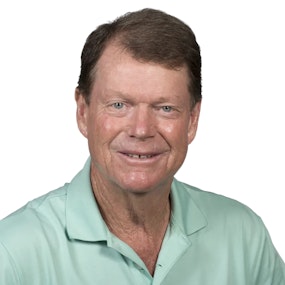
Watson, Tom
Golf Professional
Of all the players who challenged Jack Nicklaus’ supremacy, Tom Watson carved out the greatest legacy.
Watson has won 39 events on the PGA TOUR, including two Masters and a U.S. Open and a remarkable five Open Championships.
Beginning in 1977, Watson won six PGA TOUR Player of the Year awards, and he led the money list five times. Yet it was his head-to-head victories against Nicklaus, 10 years his senior, that cemented him as a player for the ages.
The first came at the 1977 Masters where Watson countered Nicklaus’ fourth-round charge with four birdies on the closing six holes to win by two. Four months later in the Open Championship at Turnberry, the two engaged in the most intense and highest caliber sustained battle in the history of Major Championship golf. Tied after 36 holes, they were paired together in the final two rounds. Nicklaus shot 65-66, only to be beaten by Watson’s 65-65.
“No other game combines the wonder of nature with the discipline of sport in such carefully planned ways. A great golf course both frees and challenges a golfer’s mind.”
Then in 1982, Nicklaus, gunning for a record fifth U.S. Open, held the lead down the stretch at Pebble Beach. Again Watson counterattacked, finally pitching in for a birdie from deep rough off the 17th hole to produce one of the most dramatic shots ever seen. When he also birdied the 72nd hole, he had won by two strokes and earned his only U.S. Open title.
Watson was born September 4, 1949, in Kansas City, Missouri. An all-around athlete growing up, the fresh-faced but fierce… Read More
New to FORE the Good of the Game?
Here are some great episodes to start with. Or, check out episodes by topic.















